Alarm Bells Ringing: 52% citizens say the risk of COVID-19 variant strains leading to a strong second wave of cases in India is now high
- ● 60% believe that the new coronavirus variants have a role to play in the latest surge
- ● Many citizens are again planning to observe social distancing and mask protocols, maintain healthier lifestyles, and save more to prepare for a strong second wave
- ● COVID-19 has put pressure on the mental health of several Indians with 30% experiencing its negative impact; cannot afford a strong and prolonged second wave
March 23, 2021, New Delhi: The COVID-19 daily caseload in India has once again crossed the 45,000-mark, which is a 4-fold rise in the last 45 days and a 3 fold rise in the last 30 days. Maharashtra, the top contributing state now has over 30,000 daily cases which is over 60% of India’s caseload. Both the SARS-COV2 variants—B.1.1.7 (UK variant) and B.1.351 (South African variant)—have been found in India but due to limited genome testing, less than 500 cases of these variants have been identified so far. The test positivity rate with this so-called second wave of COVID in India is extremely high. Districts like Amravati in Maharashtra, where the B.1.351 was identified earlier this month, still has a test positivity rate of 12%.
Based on developments in the UK and South Africa as well as the United States, the scientists have confirmed that the B.1.1.7 is atleast 50% more transmissible but unable to evade most vaccines. However, the B.1.351 is reported to be evading the current vaccines and that has got many worried. India has crossed 4 crore inoculations and is vaccinating between 20-30 lakh citizens daily with many of the senior citizens and those with co-morbidities being covered along with health and front-line workers, however, it will be the end of 2022 before the entire citizens in the country can be vaccinated and that is why the second wave is worrying.
Indians demonstrated good social distancing and mask compliance till the end of November 2020. However, with COVID fatigue setting in, many started socialising, violated social distancing norms, stopped wearing masks. Public events are being held since December, cinema halls have been opened, markets are filled with people amid declining cases of COVID in December and January.
LocalCircles in late December, based on public feedback, had escalated to the Government the risk of mutant Coronavirus urging that all flights from the UK and other high-risk countries be shut till the end of January. However, the UK flight shutdown was resumed after two weeks from January 8th 2021. With limited genome testing, the COVID variants are likely to be slowly spreading in India, leading to sizable numbers.
For this reason, there are ongoing conversations to reinforce lockdowns, night curfews, along with the issue of COVID bed non-availability. LocalCircles has conducted a national survey to understand the perception of people about the risk associated with the strong second wave of COVID in India driven by SARS-COV2 variants. The survey also sought to understand if people are planning to take social distancing precautions again and follow the mask protocols. Also, it tried to understand if people are willing to make changes in regard to making their lifestyles healthier, and financially prepare for COVID. People were also asked how they were feeling to understand their mental well-being. The survey received over 43,000 responses from citizens located in 271 districts of India.
60% citizens believe that the new variants have a role to play in the 3-fold rise in COVID cases in the last 30 days
India reported 13,742 cases on February 23rd and on March 22ND, 46,951 cases were reported marking an over 3-fold increase. Taking cognizance of the rise in the number of cases, the first question sought citizens’ perception if they believe that COVID mutant strains have a role in the 3-fold rise in COVID cases in the last 30 days. 14% said “original form of COVID (SARS-COV2)”, 7% said “new variant (B.1.1.7 or UK variant)”, 53% said “both of the above”, and 26% couldn’t say. The findings of the survey indicated that 60% citizens believe that the new variants have a role to play in the 3-fold rise in COVID cases in the last 30 days. The question in the survey received 8,669 responses.
60% citizens believe that the new variants have a role to play in the 3-fold rise in COVID cases in the last 30 days
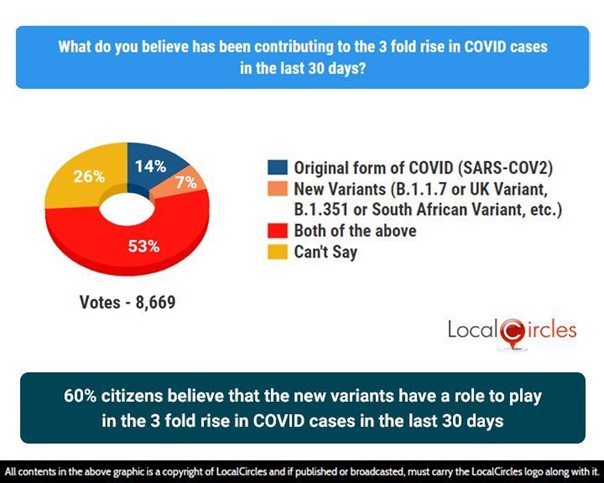
52% citizens believe that the risk of new coronavirus variants leading to a strong second wave is high
The following question in the survey asked citizens the level of risk they now feel in regard to new strains of coronavirus leading to a strong second wave in India. Of 8,434 responses that were received, 31% of citizens said “high”, and 21% said it’s “very high”, while 20% said it’s “medium”. Breaking down the poll, 10% said it is “low”, and 6% said it’s “very low”, while 12% said “can’t say”. The survey result indicated that 52% of citizens believe that the risk of new strains of coronavirus leading to a wave of cases in India is high. This finding is significant even though this wave has only been observed in Maharashtra. With 52% of citizens in the survey from across the country expressing the variant-driven second wave as a high risk indicates that Indians have started getting worried.
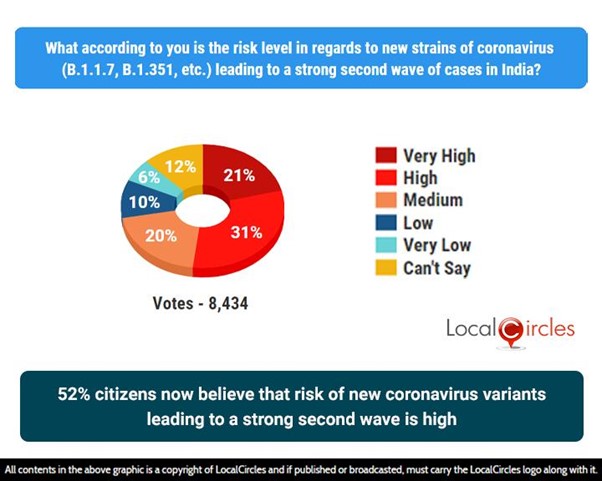
To prepare against the new coronavirus variants or second wave, people say they once again plan to observe social distancing and mask protocols followed by eating healthy and exercising regularly
Scientists studying variants of coronavirus mutation suggest that we need to continue doing what we were doing—wearing a mask, maintaining physical distance, and practicing hand hygiene—to prevent ourselves from getting infected. They also suggest that human behaviour is important to drastically reduce the chances of getting infected. To understand citizens’ preparedness, the survey findings indicated that the majority of citizens plan to observe social distancing and follow mask protocols. Also, 69% said they plan to eat healthily and exercise regularly to be better prepared for COVID variants, and thus minimise the impact.
To prepare against the new coronavirus variants or a strong second wave of cases, people plan to observe social distancing and mask protocols followed by eating healthy and exercise
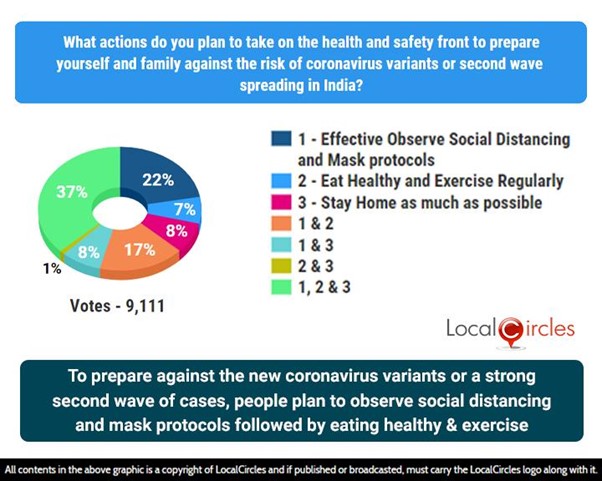
To prepare against the new B.1.1.7 coronavirus variant, most people plan to save more and keep liquid funds available for medical expenses
The pandemic induced by COVID-19 had caused a giant-fall in the Indian economy in 2020 and also impacted the personal financial situation of many households as people lost their jobs, faced salary cuts and delays within days of the lockdown. Many migrant labourers, out of work went back to their native places with literally no earnings for six to nine months. It was only in September 2020, that the economic situation started to recover and many who had no savings learned about the importance of it the hard way. Similarly, many who were impacted by COVID and needed hospitalisation without insurance coverage realised its importance. With case-loads rising once again, the survey sought citizens’ preparedness on their financial front to avert any untoward situation if the new strains of coronavirus spread rapidly. The result of the poll indicated that most citizens plan to save more and keep liquid funds available for medical expenses. The rising case-loads are likely to have bearing on the spending as the focus of consumers like in 2020 will move from discretionary purchases of products and services to essentials.
To prepare against the new B.1.1.7 coronavirus variant, most people plan to save more and keep liquid funds available for medical expenses
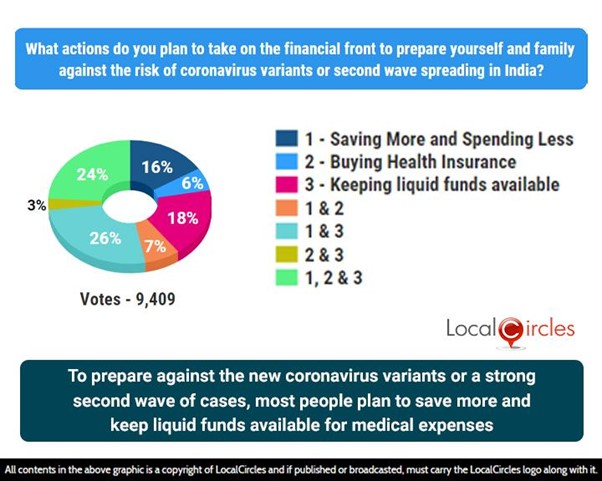
12 months into the COVID-19 pandemic, 15% citizens feel anxious or worried, while 11% are feeling depressed or gloomy
The last 12 months have been a difficult period for many families who lost their dear ones due to COVID—or, one of the members got hospitalised with others in the family trying to arrange tests, beds, and taking care of them. There were also cases where loved ones could not be with each other at a critical time of need. All of this left many with wounds that will take a long time to heal. Then there were those who lost their livelihoods, jobs or had their earnings cut as businesses remained closed or operated with restrictions. In addition to these, there were also senior citizens who had to limit their movements and social networking, making them feel lonelier than ever. Even women had to multitask like never before running their household, taking care of children with school shut most of the year, while many were also working full-time from home. For many students who are used to being around with friends in schools and colleges, staying at home behind screens has caused levels of psychological damage. With daily case-loads rising once again, the final question asked citizens about how they are currently feeling. In response, 15% of citizens said they are feeling “anxious or worried”, 11% said they are feeling “depressed or gloomy”, and 3% said “angry”. On the other hand, 19% of citizens said they feel “optimistic or enthusiastic”, 26% said “calm or peaceful”, and 17% said “thankful”. With COVID cases that started to decline since late November 2020, people started to meet family and friends, stepped out more frequently for shopping and dining, attended weddings, and many also started going back to workplaces. Earnings also started to come back as the economy recovered. All of this led to 70% feeling positive. However, with rising cases and the fear of a strong COVID second wave, the other 30% are not feeling positive. If the second wave turns out to be as strong, chances are this percentage is likely to go up from 30%, potentially leaving a large number of people in a poor mental state.
12 months into the COVID-19 pandemic, 15% citizens feel anxious or worried, while 11% are feeling depressed or gloomy
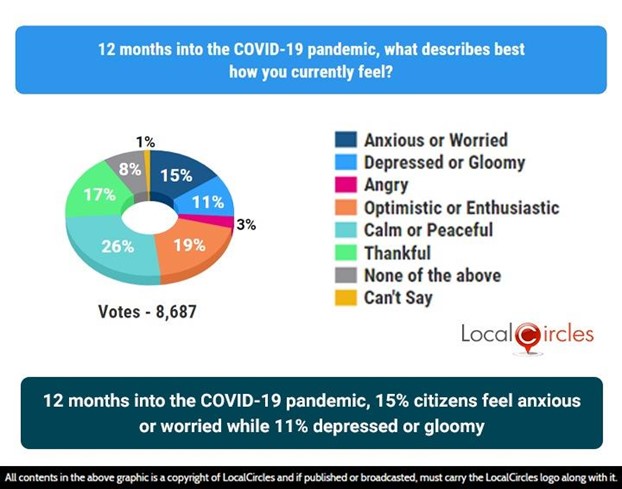
Overall, the findings of this study clearly indicated that with COVID case-loads rising in India and the massive surge experienced in Maharashtra, 52% of citizens in the survey now feel that the risk of a strong second wave driven by coronavirus variants is high. The silver lining here is that with so many people realising the risk, people are once again willing to take social distancing precautions, wear masks and have healthier lifestyles.
From the learnings of handling COVID in 2020 and a massive vaccination drive that has inoculated over 4 crore citizens with approximately 30 lakhs getting it each day, India is poised to handle the second wave much better. With a combination of increased genome testing, sensitisation of citizenry and enforcement along with restrictions, the Central and State Governments will be able to get people to step-up once again and follow COVID appropriate behaviour. Hence India can significantly minimise the second COVID wave and the associated economic impact from it.
Survey Demographics
43000+ responses were received from citizens residing in 271 districts of India. 69% respondents were men while 31% respondents were women. 49% respondents were from tier 1, 29% from tier 2 and 22% respondents were from tier 3, 4 and rural districts. The survey was conducted via LocalCircles platform and all participants were validated citizens who had to be registered with LocalCircles to participate in this survey.
About LocalCircles
LocalCircles, India’s leading Community Social Media platform enables citizens and small businesses to escalate issues for policy and enforcement interventions and enables Government to make policies that are citizen and small business centric. LocalCircles is also India’s # 1 pollster on issues of governance, public and consumer interest. More about LocalCircles can be found on https://www.localcircles.com
For more queries - media@localcircles.com, +91-8585909866
All content in this report is a copyright of LocalCircles. Any reproduction or redistribution of the graphics or the data therein requires the LocalCircles logo to be carried along with it. In case any violation is observed LocalCircles reserves the right to take legal action.


